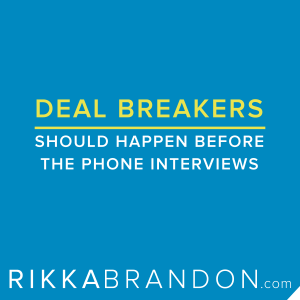Transcript
Today, I’m going to teach you a major time-saving trick that’s so stupid simple you won’t believe you haven’t been doing it forever, and if you have been doing it already, thumbs up, dude. You’re awesome. This is what I like to call “deal breakers.” It’s a pretty complex idea, but you can probably get it though.
The deal’s not going to work if one of these things isn’t met.
There are two sides of the deal-breaker coin.
The first side is the employer’s side, where maybe you really need somebody with a bachelor’s degree. I don’t really think that should be a deal breaker, but that’s a topic for another time. But it could be that you need them to live within 30 minutes of your location, they need to be licensed in whatever it is, they need to have experience with your software, or whatever it is.
There are certain things that you know “This is key to them being successful in the role, and if they don’t have that, I don’t even want to waste time talking to them because frankly, it’s going to be a waste of time for everyone.”
Those are your deal breakers.
The candidate deal breakers are a little bit different. They’re reasons that people might decline your opportunity. A lot of times, that is your schedule, so if you require evenings, or overnights, or weekend work, that is a deal breaker for a lot of candidates.
Another really common deal breaker on the candidate side is when you have no benefits, or a very limited benefits package. Sometimes they just can’t say yes to that. They might have somebody in their family who has ongoing health issues and need to have a solid health benefits program. There are lots of reasons that a minimal benefits package can be a problem when you’re hiring.
You’re going to want to think about reasons people have declined in the past.
 If it’s compensation, if you know you’re a little bit on the low end, you have to talk about it right away. I know you think you’re going to keep them in for three interviews and then be like, “Hey, it’s $11 an hour, but you love us, right?” That doesn’t work.
If it’s compensation, if you know you’re a little bit on the low end, you have to talk about it right away. I know you think you’re going to keep them in for three interviews and then be like, “Hey, it’s $11 an hour, but you love us, right?” That doesn’t work.
Don’t do it. All you’re doing is wasting their time and your time, and you’re pissing them off.
If you know your pay is a little bit low or average, just say, “Hey, where are you at right now? I just want to make sure I’m not wasting your time.” If they say $17 an hour and you were thinking $12, you’re either way off or they are way too experienced for what you need.
I want you to talk about that right away so that you don’t waste your time talking to people you can’t actually afford and who aren’t going to say yes to your offer.
Deal breakers should happen before the phone interviews.
You get the phone interview set up, the first thing you want to say is, “Hey, I just want to go over a couple of things to make sure I don’t waste your time or mine. So we’re just going to go over this. Are you okay working Saturdays? Blah, blah, blah.” You run through them.
Typically I like to keep it to three or four, because if you have seven deal breakers, that gets a little awkward – “And another thing that sucks…” We don’t want to do that. Think about the top three things you need, and the top three things that they might say no to, and come up with that, just to make sure you are talking to people who are more likely to say yes.
I hope this helps.
Happy hiring!
Wahoo! You made it to the bottom of the post! I’m going take a quick moment and pat myself on the back for writing content you liked enough to read to the end!
Do you know anyone else who could benefit from learning more about hiring? If so, make it easy for them and share it on Twitter, Facebook, and Pinterest .
Looking for more help with hiring? Check out my Fool Proof Interviewing video series.


Recent Comments